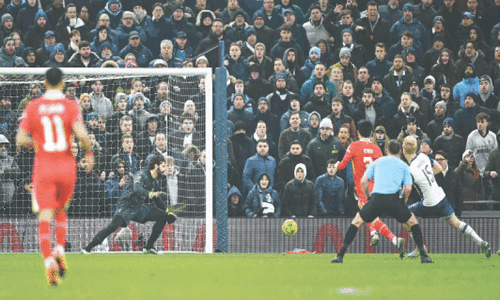
PARIS: An extremist’s killing spree has turned the spotlight on the risk of extremist Islamic indoctrination in prisons, but France’s intelligence chief said Mohamed Merah had learned his radicalism alone.
President Nicolas Sarkozy announced in the immediate aftermath of 23-year-old Merah’s attacks and violent end, that France would take measures to stamp-out extremist proselytising in prisons.
“We cannot allow our prisons to become seed-beds for the indoctrination of ideologies of hate and terrorism,” the president said, demanding a “thorough reflection” on measures to control the threat.
But most experts who spoke on Friday said the young man had taken time in prison to radicalise himself, rather than falling victim to recruiters.
Christian Etelin, a lawyer who represented the self-declared al-Qaeda follower during his earlier teenage career as a petty criminal, said after he was killed in a shoot-out with police that he had become radicalised in jail.
Merah, now 23, was jailed at 19 for a series of thefts and violent crimes and spent two years in jail. After his release he headed to Afghanistan and Pakistan where he claims to have received training from al-Qaeda.
“It was during his time in prison that he began to radicalise himself,” prosecutor Francois Molins told reporters this week.
And the head of France’s DCRI domestic intelligence agency, Bernard Squarcini told the daily Le Monde: “According to statements he made during the siege, he self-radicalised in prison, on his own.”
While most experts accept that violent extremist groups do recruit in jails, they said a very small proportion of the young men of Muslim background exposed to extremist propaganda end up joining jihadist groups.
“Very few really fall into this,” said Louis Caprioli, a former senior interior ministry official charged with anti-terror and counter-espionage.
“Most of these young guys, when they come out of jail, want to go out with girls, steal BMWs and Mercedes, sell heroin for money,” he said. “They go back to the sensual pleasures of their former lives.
“Only the fringe of the fringe, like Mohamed Merah, follow the logic through to its conclusion,” he argued.
While lawyer Dominique Many said that Muslims who had travelled to Pakistan or Afghanistan were admired in prison as “resistance fighters”, other experts played down their long-term influence on less hardened recruits.
Farhad Khosrokhavar, director the EHESS social sciences school, said another strand of Islamic thought, “hyper fundamentalism”, was growing in prisons.
Adherents to this ideal close in on themselves and dedicate much time to Islamic studies and prayer, but are not generally violent.
In September 2008, the French interior ministry estimated that only “just over 100” detainees among a national prison population of 63,000 inmates were undergoing a process of radicalisation.
French authorities do not keep records of a citizen’s religious leanings but, based on the number of prisoners who refuse to eat pork, estimate the proportion of Muslim detainees at between 30 and 40 per cent.
Celine Verzeletti of the CGT union, which represents prison officers, said:
“A few years ago we warned of the need for vigilance, but I have the impression that radicalisation is less common today.”
Verzeletti said more “Muslim chaplains” were being allowed to work in jails, helping prisoners who want to live a mainstream religious life.”
“Where there’s a chaplain, there’s no ‘self-declared imam’,” explained Moulay El Hassan El Alaoui Talibi, head of the Muslim chaplains in French jails.
“The chaplain is the benchmark. If there’s none, there’s a risk.”The number of Muslim clerics working in jails has tripled since 2006 to around 150, he said.
Abdelhak Eddouk, who works with Muslim prisoners in Fleury-Merogis jail outside Paris, agreed, explaining that chaplains can quickly respond to and defuse through argument the development of dangerous ideas.














































